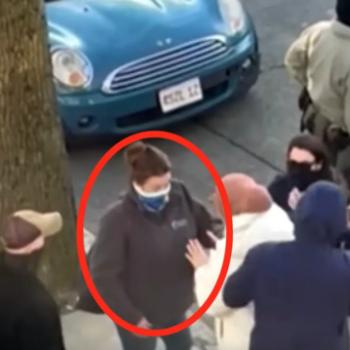Vermont is a small town of a state. It’s small enough that everybody knows everybody else and small enough that everybody knows everybody else’s business.
This is why I’d be extremely skeptical of any allegations of deep dark secrets involving, for example, Bernie Sanders. It’s not that it would be impossible for him to have kept deep dark secrets in that small town of a state, but it’s a lot less likely when somebody has been that big a fish in that small a pond for so many years.
Ask anybody over the age of 10 in Vermont and they can tell you a Bernie story. This is their first-hand account of one of the times they’ve met him or spoken with him, because almost everyone up there has, more than once. And we’re not talking about the big public event type encounters that those of us from big states might sometimes have with our elected officials. We’re talking stories about standing in line behind him at the post office, or about literally bumping into him at a county fair, or about the size of the tip he left at the diner.

I’ve lived in Pennsylvania since the 1980s. I spoke to Arlen Specter once at a town hall. I saw Ed Rendell once at the Mummer’s Parade. Harris Wofford came by the office once when I was canvassing for his Senate campaign and I shook hands with Joe Sestak one time when I was phone-banking for his congressional campaign. But that’s it. I’ve never conversed or chatted with any prominent officials from my state. I’ve never even met Bob Casey Sr., or Bob Casey Jr., or Pat Toomey, or Tom Wolf, or Rick Santorum, or Tom Ridge. I never even met Joe Hoeffel when I spent weeks volunteering for two of his campaigns back in the day.
But my family in Vermont actually knows their senators. My dad never voted for Pat Leahy, but he walked a mile with him on a cancer charity thing twice. They’d ask about one another’s grandchildren. By name.* Small-town states are different.
This near-universal public familiarity with Bernie Sanders might be mostly an inch-deep and a mile wide — it might be, in other words, too shallow to get past the duplicitous surface of a man whose darkest secrets remain hidden and unknown. But the intimacy and peculiarity of these small-town encounters has given Vermonters a long-term look at the nature and character of the man. If Bernie had been putting on an act all this time, or somehow leading a double life to conceal heinous behavior, he would have had to be superhumanly devious not to have allowed that mask to slip somewhere along the line in all those intimate encounters with all those neighbors over all those years.
That’s what life means in such a close-knit small town of a state. People know you. Vermonters know Bernie. They’ve seen him up close and they’ve seen him for a long, long, long time.
This is not to say, of course, that all Vermonters like Bernie. Most do, but many don’t. Some of those Bernie stories that Vermonters could tell are not positive, happy stories. (He’s still a Flatlander, after all — and for some Vermonters that doesn’t change even after 50 years. Heck, Maria von Trapp lived there for decades and old Vermonters still considered her a Flatlander even though she’d come from the Alps.) Spend enough time asking Vermonters about their Bernie stories and you’ll hear some that are not flattering portrayals of the mayor/representative/senator. Those stories are sometimes circulated with a greater urgency and enthusiasm than the positive stories are. That’s how it goes in a small town.
Those negative Bernie stories make me even more skeptical of the notion that the man might be hiding any heretofore unrevealed deep dark secrets. There’s a substantial (for small-town equivalents of “substantial”) audience out there that would be eager to hear and spread any hint of such dark secrets. They’ve been looking for them for decades now. Every ambitious politician in a state that size has been dying to find some scandal that would free up some chance at higher office. So it would be a remarkably unusual thing if there weren’t any wild rumors or whispers already circulating that at least pointed somewhere in the direction of whatever still-hidden dark secrets lurked unrevealed.**
Yes, again, none of this makes it impossible for there to still be some deep, dark secret lurking in Bernie’s past — something utterly at odds with the public’s knowledge and public’s perception of the man over all of this time. But it makes any such claim extreme and extraordinary. Vermont may be a small town, but there are half a million people in that small town, all of whom are quite confident that they more or less know this guy. “That’s Bernie,” they say, “That’s Bernie being Bernie.” And this is based on years of experience and eyewitness evidence. The suggestion that they’re all wrong about that — that Bernie is not Bernie, but that he is something other than what he has appeared to be this whole time — isn’t something we should glibly accept without evidence that would be proportional to the massive, jarring strangeness of the claim for so many people who think they know him well.
So far we’ve only talked about the general public, but it’s also true that, as small as it is, Vermont is home to several credible journalistic outlets that have all been covering Bernie Sanders since the 1970s. Today, in 2020, many of those newspapers and radio stations have been hollowed out to the extent that they might now be incapable of catching any scent of scandal, let alone of pursuing it with the relentlessness of a young Woodward and Bernstein. But that hollowing out has occurred mostly in just the last decade and, before that, Bernie was being closely covered by a half-dozen dogged and intimately familiar reporters for more than 40 years.
And while Bernie hasn’t always been an A-list national political figure, he has been serving in Washington for decades, in and out of a national spotlight — including some time on the biggest stage of all, in presidential campaigns attracting the scrutiny of reporters from newspapers and TV news organizations with all the resources at their disposal. Some of those reporters might be friendly, others might be aggressively hostile, others might be sensationalistic or they might be obsequious chasers of access or they might be lazy stenographic hacks. But over time, whatever their strengths or shortcomings or predispositions, dozens of them have covered the story of Bernie Sanders, from dozens of different angles, seeking new angles and new stories that others had missed.
Is it possible that all of those local and national reporters missed some very big story about some deep dark secret that Bernie was concealing all that time? Is it possible that the real Bernie is someone radically different than the Bernie that all those reporters think they know? Is it possible that this “real” Bernie has secretly been doing something corrupt or cruel or evil all this time without any of them having ever detected enough of a whiff of it to have at least tried reporting on it?
Yes, it’s possible. Unlikely, but still possible. Just consider the example of another “Bernie” who became an adopted New Englander — Cardinal Bernard Law. Boston is not a small town — it’s 16 times bigger than Burlington, Vermont. But for a “big city” it’s still only slightly larger than the population of all of small-town Vermont. For decades, most of Boston was sure that they knew the “real” Cardinal Law, until years later they found out they really didn’t — found out that this man whose character and nature they were sure they knew had been, all along, someone very different, someone involved in the cover-up of unspeakably horrible crimes against the innocent.
The Academy Award-winning movie Spotlight does a good job telling the story of how Bernard Law’s deep, dark secrets were ultimately reported and revealed. But importantly, and powerfully, that story also shows the many ways that those “secrets” were never wholly secret. Once the full scope of the crimes and the cover-up started to be documented, the dam burst and previously buried or dismissed stories were revisited, reinvestigated, and reinterpreted to get at the underlying truth. Good reporters dug out old dead-ends — rumors and leads from years before that they had once tried and failed to confirm. Otherwise good reporters (like Michael Keaton’s character in Spotlight) were forced to come to grips with their prior failings — leads they had once failed to pursue, testimony from witnesses they had previously dismissed as cranks or crackpots. Those reporters were forced to take a hard look at themselves in the mirror and admit that they should have paid more attention to the hints they had ignored, to admit that they should have believed people they had shrugged off as unbelievable.
That’s a sobering, cautionary theme in Spotlight. It’s a reminder that we need to be skeptical even of our own skepticism, that we need to be wary of our human tendency to refuse to believe what we don’t want to believe, because sometimes the truth is uglier than we want to know.***
It’s also a reminder, though, that it would be very unusual to later learn of deep, dark secrets that were, for years on end, wholly and entirely secret. No whispers, no earlier hints ignored, no earlier testimonies dismissed. Again, that’s not in itself conclusive. “I’ve never heard of any such thing” does not mean that any such thing might not be true. Nor even does “None of the thousands of us around here who ought to have heard of such a thing have ever heard of such a thing” in any way prove that such a thing cannot be. But it would be extraordinary.
It’s one thing if everyone in a small town is finally forced to at last acknowledge the fringe rumors and whispers and hints they’d previously all refused to explore any more closely. But it’s quite another thing to suggest that somehow everyone in that small town was, for years, completely oblivious to some deep, dark secret that contradicted everything they thought they all knew about someone they had all been intimately familiar with for decades.****
So if we hear some new allegation about some deep, dark secret in Bernie Sanders’ past — something previously unknown, unhinted at or unwhispered about by anyone in the small town of a state where he’s been a well-known figure, loved and hated, for 50 years — we should be skeptical. Not automatically dismissive, but certainly not automatically credulous — toward either the allegations or toward any alleged evidence of them.
It is, again, possible that everybody who thinks they’ve known this man doesn’t know him at all. It’s even possible that he’s capable of a devious duplicity that nothing we’ve heretofore witnessed suggests he’s capable of. It’s possible that, all along, his sometimes garbled, sometimes awkward self-presentation — the thing that makes us all see him and think, “That’s just Bernie being Bernie, for better or worse, because he hasn’t ever been able to be anything else, bless his heart” — has been an act all along, one carried out for years with a frightening consistency to keep us from ever seeing the darker authentic Bernie lurking beneath. That’s possible. After all, he is a senator — a powerful man who has pursued a position of even greater power. And who knows what evil lurks in the hearts of men?
My point here is simply that secrets are hard to keep in a small town. So if you want to convince me that one of the most apparently transparent and guileless politicians we’ve ever seen is actually a deviously duplicitous sociopath who’s had everybody in his small town of a state fooled ever since the Ford administration then, well, you’re going to have to bring lots of receipts.
– – – – – – – – – – – –
* For the record, my Republican family is uniformly impressed with Pat Leahy’s neighborly friendliness and his innate knack for the retail politics of school awards ceremonies and county fairs. They’re likewise uniformly amused by what they describe as Bernie’s somewhat awkward, cranky impatience with that part of his job. But they seem to think of him as endearingly awkward and cranky. Again, I don’t think they’ve ever voted for Bernie, or that they ever would, but they’re sort of fond of voting against him, and sort of fond of him on a personal level because he’s theirs, even if only in the sense that he’s their guy to vote against. (That and they’re sort of begrudgingly grateful for Dr. Dynasaur, which wasn’t specifically Bernie’s doing, but is absolutely Bernie-esque.)
** What I’m talking about here as possible “deep, dark secrets” in Bernie’s past has nothing to do with the kinds of things that already exist in the opposition-research files of GOP operatives ready to be rolled out if he ever became their opposition’s presumptive nominee. The guy has been a public figure for decades and professional political operatives have tons of fodder they can weaponize — decades of votes to be spun uncharitably, dubious public statements, every negative aspect of his personal life that’s ever been reported on. I’m not talking here about this wholly predictable rehashing of his past (“He praised Cuba!“) but of some wholly new and previously unanticipated allegation of something unexpected and otherwise in conflict with the Bernie that everybody in his small-town home state thinks they know.
My skepticism would be further heightened if such incompatible-with-the-apparent-Bernie-the-whole-small-town-thinks-they-know accusations seemed cut-and-pasted from the script of some other, very different figure’s actual scandals. If, for instance, he were suddenly accused of selling millions of dollars of stock based on insider information from a Senate briefing — just exactly and precisely like Georgia Sen. Kelly Loeffler. After which he cackled cruelly that insider trading laws were “for the little people” — just exactly and precisely like Leona Helmsley. That carbon-copy similarity would seem suspiciously and implausibly coincidental. It might be true that Bernie is, secretly, just exactly like Loeffler and Leona. But it would seem more likely that the accusations were from someone trying to make that argument by fabricating a too literal story.
It’s not impossible that Bernie Sanders once shot a man in Reno just to watch him die. But if he were suddenly accused of having done so, you would likely note that, hey, wait a minute, I’ve heard those exact words somewhere before. And noticing that would not make you an apologist for gun violence in gambling towns.
*** In partial defense of those human-and-therefore-fallible Boston reporters, though, we should bear in mind that the eventual reporting exposing the widespread clergy sexual abuse of children and its cover-up came soon after the high-water mark of the Satanic Panic of the 1980s and 1990s. That was a time when “Believe the Children” became a dangerous, reckless, unchallengeable slogan that wound up putting hundreds of innocent people in prison all over America. It became a toxic and intoxicating promise of blanket self-righteousness that required scapegoats for lurid, unspeakably evil crimes — whether or not those crimes actually occurred.
The imaginary horrors of the Satanic Panic made it harder for principled reporters and prosecutors to achieve what they did in the years that followed, exposing and punishing real abuses of real children in the church or in State College through the hard work of ignoring weaponized slogans and, instead, collecting and corroborating facts and evidence. That work was done in spite of, not because of, “Believe the Children.”
**** This sometimes happens, of course. It’s what gives E.A. Robinson’s “Richard Cory” such lasting power. But poor Richard Cory was far more interested in, and capable of, keeping up appearances than a man like Bernie Sanders has ever seemed to be. Bernie may be many things, but “admirably schooled in every grace” isn’t one of them.
















